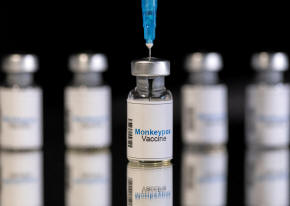U.S. to get 36,000 more monkeypox vaccine doses this week, HHS says
 Send a link to a friend
Send a link to a friend
 [June 07, 2022]
By Julie Steenhuysen [June 07, 2022]
By Julie Steenhuysen
(Reuters) -The Department of Health and
Human Services (HHS) said on Monday it had instructed monkeypox vaccine
manufacturer Bavarian Nordic to deliver an additional 36,000 doses this
week as part of a drawdown from a U.S. vaccine stockpile.
In a statement, HHS said the doses will be added to the existing 36,000
in the U.S. Strategic National Stockpile.
Bavarian Nordic's vaccine, called Jynneos, is approved to treat both
monkeypox and smallpox.
The Danish company, which developed the vaccine with the support of HHS'
Biomedical Advanced Research and Development Authority, still has more
than 1 million government-owned doses of the vaccine on hand. Another
16.4 million doses of vaccine could be finished if needed, HHS said.

During a news briefing last week, HHS official Dawn O'Connell said
Bavarian Nordic can store the vaccine at a lower temperature than is
possible once in the stockpile, extending the vaccine's shelf life by
about two years.
In addition to the Bavarian Nordic vaccine, the United States has more
than 100 million doses of ACAM2000, a smallpox vaccine from Emergent
BioSolutions Inc, that is also effective against monkeypox.
[to top of second column]
|

Mock-up vials labeled "Monkeypox vaccine" and medical syringe are
seen in this illustration taken, May 25, 2022. REUTERS/Dado Ruvic/Illustration
 As of June 3, the government has
delivered about 1,200 vaccines and 100 courses of treatment within
the United States.
The United States has so far 25 confirmed cases of monkeypox,
according to the Centers for Disease Control and Prevention. The
agency on Friday urged U.S. doctors to test for monkeypox if they
suspect cases, saying there may be community-level spread but that
the overall public health risk remained low.
Around 30 countries where monkeypox is not endemic have reported
outbreaks of the viral disease, with more than 911 confirmed or
suspected cases mostly in Europe, according to the World Health
Organization, Reuters reporting and local data.
(Reporting by Julie Steenhuysen in Chicago and Susan Heavy and Rami
Ayyub in Washington; Editing by Bill Berkrot)
[© 2022 Thomson Reuters. All rights
reserved.] This material may not be published,
broadcast, rewritten or redistributed.
Thompson Reuters is solely responsible for this content. |